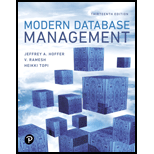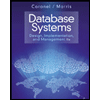
Pearson eText for Modern Database Management -- Instant Access (Pearson+)
13th Edition
ISBN: 9780137305940
Author: Jeffrey Hoffer, Ramesh Venkataraman
Publisher: PEARSON+
expand_more
expand_more
format_list_bulleted
Concept explainers
Textbook Question
Chapter 2, Problem 2.19RQ
In addition to explaining what action is being taken, what else should a relationship definition explain?
Expert Solution & Answer
Want to see the full answer?
Check out a sample textbook solution
Students have asked these similar questions
Entity-relationship diagrams have a specific function, which is explained below. And what kind of symbol is utilised to represent a relationship, and how does it function? In what way does the word "associative entity" convey that something is happening and what does it mean? Could you provide an example?
How does an entity-relationship diagram work and what precisely is it?
Draw an entity-relationship diagram, including minimum and maximum cardinality, for the
following: The system stores information about two things: cars and owners. A car has attributes
for make, model, and year. The owner has attributes for name and address. Assume that a car
must be owned by one owner and an owner can own many cars, but an owner might not own
any cars (perhaps she just sold them all, but you still want a record of her in the system).
Chapter 2 Solutions
Pearson eText for Modern Database Management -- Instant Access (Pearson+)
Ch. 2 - Define each of the following terms: entity type...Ch. 2 - Match the following terms and definitions....Ch. 2 - Contrast the following terms: stored attribute;...Ch. 2 - Prob. 2.4RQCh. 2 - Prob. 2.5RQCh. 2 - Prob. 2.6RQCh. 2 - State six general guidelines for naming data...Ch. 2 - Prob. 2.8RQCh. 2 - Prob. 2.9RQCh. 2 - State three conditions that suggest the designer...
Ch. 2 - List the four types of cardinality constraints,...Ch. 2 - Give an example, Other than those described in...Ch. 2 - What is the degree of a relationship? List the...Ch. 2 - Give an example (Other than those described in...Ch. 2 - Give an example of each of the following, other...Ch. 2 - Give an example of the use of effective (or...Ch. 2 - State a rule that says when to extract an...Ch. 2 - Prob. 2.18RQCh. 2 - In addition to explaining what action is being...Ch. 2 - For the Manages relationship in Figure 2-12a,...Ch. 2 - Explain the distinction between entity type and...Ch. 2 - Why is it recommended that every ternary...Ch. 2 - A cellular operator needs a database to keep track...Ch. 2 - Prob. 2.24PAECh. 2 - Answer the following questions concerning Figure...Ch. 2 - Prob. 2.26PAECh. 2 - You may have been assigned a CASE or a drawing...Ch. 2 - Consider the two E-R diagrams in Figure 2-25 Q,...Ch. 2 - Prob. 2.29PAECh. 2 - Are associative entities also weak entities? Why...Ch. 2 - Because Visio does not explicitly show associative...Ch. 2 - Figure 2-26 shows a grade report that is mailed to...Ch. 2 - Prob. 2.33PAECh. 2 - The Is Married To relationship in Figure 2-12a...Ch. 2 - Figure 2-27 represents a situation of students who...Ch. 2 - Figure 2-28 shows two diagrams (A and B), both of...Ch. 2 - Prob. 2.37PAECh. 2 - Review Figure 2-8LQ and Figure 2-22. Identify any...Ch. 2 - Prob. 2.39PAECh. 2 - Prob. 2.40PAECh. 2 - Prob. 2.41PAECh. 2 - Prob. 2.42PAECh. 2 - Prob. 2.43PAECh. 2 - Prob. 2.44PAECh. 2 - Prob. 2.45PAECh. 2 - Prob. 2.46PAECh. 2 - Prob. 2.47PAECh. 2 - Prob. 2.48PAECh. 2 - Draw an ERD for the following situation. (State...Ch. 2 - Prob. 2.50PAECh. 2 - Prob. 2.51PAECh. 2 - Review your answer to Problem and Exercise 2-49 if...
Knowledge Booster
Learn more about
Need a deep-dive on the concept behind this application? Look no further. Learn more about this topic, computer-science and related others by exploring similar questions and additional content below.Similar questions
- ENHANCE ENTITY RELATIOSHIP DIAGRAM The entity type PERSON has the following attributes: SSN, name, address (City/State/Zip), date of birth, age, and contact number. The entity also has the three subtypes: CAMPER, BIKER, AND RUNNER. Draw a separate diagram segment for each of the following situations: 1. At a given time, a person must be exactly one of three subtypes. 2. A person may or may not be one of these subtypes. However, a person who is one of these subtypes cannot at the same time be one of the other subtypes. 3. A person may or may not be the one of these subtypes. On the other hand, a person may be any two (or even three) of these subtypes at the same time. 4. At a given time, a person must be at least one of these subtypes.arrow_forwardDraw an Entity Relationship Diagram for all of those below. Draw an ER diagram to represent information about students. A student is identified by his/her student number. Student’s name (first and last), permanent address, phone number, gender and date of birth are also stored. An airplane has a registration number, type, number of economy class seats, number of business class seats and the year of production. Some students live in student halls. Each hall has a name (unique) and an address. Each student has a number (unique) and a name. Assume that there are students living in every hall. Each text book has a unique ISBN (International Standard Book Number), and contains several chapters. Each chapter has a chapter number (unique within a book), the number of pages and the number of references. A chapter covers a single topic, but the same topic may be covered in various books. Each lecturer is identified by a unique number, name and phone. A lecturer teaches several courses, and for…arrow_forwardwhat can be very interesting about the Entity-Relationship (ER) Modeling that people may forget about ( i am not talking about the main function or explication but just a concept/part that people tend to overlook when they study it for the first time?arrow_forward
- Design an Entity-Relationship (E-R) diagram for a university management system. The system should capture information about the following: . Students, with the following attributes: student ID, name, date of birth, and email address. • Courses, with the following attributes: course ID, course name, and credit hours. • Professors, with the following attributes: professor ID, name, and email address. Additionally, consider the following relationships: • A student can enroll in multiple courses, and a course can have multiple students enrolled. • A course is taught by a single professor, and a professor can teach multiple courses. Show all entities, attributes, and relationships in your E-R. diagram, including the cardinality of cach relationship.arrow_forwardDraw an Entity relationship diagram (ER) for a university according to the following rules: ‐ For each student the university needs to keep track of: first name, last name, student id, address, phone no and their major. ‐ The student id is identical for each ‐ Each course has a number, name and credit. The course number is unique for each course. ‐ Each department has a name, code and The code is unique for each department. ‐ Each course may has one or more sections where each section is belong to only one ‐ A department offers one or many 7-‐ Some courses have perquisite courses. 8-‐ Each student could register in one or more courses. In your diagram you need to show the following: 1-‐ The primary key for each entity. 2-‐ The cardinality and participation between entities.arrow_forwardGive a simple example of an E-R diagram for each concept and then write the business rules for each example. associative entity weak entity unary relationshiparrow_forward
- Entity Relationship Diagram and Class Diagram are two diagramming techniques sharing common ancestry. Please contrast and compare the two. What are the similarities and the differences?arrow_forwardQ1. Draw an E-R Diagram for the following situation. At the university system each STUDENT must be assigned an ADVISOR who counsels students about degree requirements and helps students register for classes (COURSE). Each student must register (REGISTRATION) for classes with the help of an advisor, but if the student's assigned advisor is not available, the students may register with any advisor, We must keep track of students, the assigned advisor for each, and the name of the advisor with whom the students registered for the current term. Tips: Attributes of STUDENT include Student ID (the identifier), Name, and Major. Attributes of ADVISOR include Advisor ID (the identifier), Name, and Department. Attributes of COURSE include Course ID (the identifier), Title, and Credits. Attributes of REGISTRATION include Semester, and Year. Based on your background, think of logical and standard relationships between the given entities.arrow_forwardCreate an Interaction Model Use Case Model 1. Create use case summaries for a Employee Payroll System, Some suggested names are: Enter employee information, Print employee pay Snub, Perform maintenance, Perform backup, View employee records, etc. 2. Create a use case description for “Print Employee Pay Snub"...You should have several use case descriptions but only list one for this assignment. 3. Create a Use Case diagram for an Employee Payroll System, Include at least 3 actors. Sequence Model 1. Create a Scenario for a sequence of events that occur during one particular execution the system This should be listed as one of the actors (or whatever you chose to name them) in the use case diagram. 2. Create a Sequence Diagram Note: there should be a Sequence diagram for each Use Case listed in your use case summary, (if there are 4 Use Cases there should be 4 Sequence Diagrams).arrow_forward
- How are entity-relationship diagrams used? What kind of symbol is utilized to represent a relationship? What does the term "associative entity" mean? Give an example.arrow_forwardDraw a simple class diagram that shows the following business rules. Include the multiplicities for each relationship. An employee has one office number, and a unique office number is assigned to an employee. A student club should at least have one student, and a student can join many other clubs in the university. A bank branch can have zero or more customers and each customer is on one and only one branch.arrow_forwardDraw an entity relationship (ER) diagram of subject enrollment through LMS.arrow_forward
arrow_back_ios
SEE MORE QUESTIONS
arrow_forward_ios
Recommended textbooks for you

 Fundamentals of Information SystemsComputer ScienceISBN:9781305082168Author:Ralph Stair, George ReynoldsPublisher:Cengage Learning
Fundamentals of Information SystemsComputer ScienceISBN:9781305082168Author:Ralph Stair, George ReynoldsPublisher:Cengage Learning Principles of Information Systems (MindTap Course...Computer ScienceISBN:9781285867168Author:Ralph Stair, George ReynoldsPublisher:Cengage Learning
Principles of Information Systems (MindTap Course...Computer ScienceISBN:9781285867168Author:Ralph Stair, George ReynoldsPublisher:Cengage Learning Database Systems: Design, Implementation, & Manag...Computer ScienceISBN:9781305627482Author:Carlos Coronel, Steven MorrisPublisher:Cengage Learning
Database Systems: Design, Implementation, & Manag...Computer ScienceISBN:9781305627482Author:Carlos Coronel, Steven MorrisPublisher:Cengage Learning Database Systems: Design, Implementation, & Manag...Computer ScienceISBN:9781285196145Author:Steven, Steven Morris, Carlos Coronel, Carlos, Coronel, Carlos; Morris, Carlos Coronel and Steven Morris, Carlos Coronel; Steven Morris, Steven Morris; Carlos CoronelPublisher:Cengage Learning
Database Systems: Design, Implementation, & Manag...Computer ScienceISBN:9781285196145Author:Steven, Steven Morris, Carlos Coronel, Carlos, Coronel, Carlos; Morris, Carlos Coronel and Steven Morris, Carlos Coronel; Steven Morris, Steven Morris; Carlos CoronelPublisher:Cengage Learning


Fundamentals of Information Systems
Computer Science
ISBN:9781305082168
Author:Ralph Stair, George Reynolds
Publisher:Cengage Learning

Principles of Information Systems (MindTap Course...
Computer Science
ISBN:9781285867168
Author:Ralph Stair, George Reynolds
Publisher:Cengage Learning

Database Systems: Design, Implementation, & Manag...
Computer Science
ISBN:9781305627482
Author:Carlos Coronel, Steven Morris
Publisher:Cengage Learning

Database Systems: Design, Implementation, & Manag...
Computer Science
ISBN:9781285196145
Author:Steven, Steven Morris, Carlos Coronel, Carlos, Coronel, Carlos; Morris, Carlos Coronel and Steven Morris, Carlos Coronel; Steven Morris, Steven Morris; Carlos Coronel
Publisher:Cengage Learning
Enhanced Entity Relationship Model; Author: Data Science Center;https://www.youtube.com/watch?v=ocQUtXPumdQ;License: Standard YouTube License, CC-BY